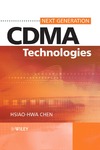Future wireless communication systems should be operating mainly, if not completely, on burst data services carrying multimedia traffic.The need to support high-speed burst traffic has already posed a great challenge to all currently available air-link technologies based either on TDMA or CDMA.The first generation CDMA technology has been used in both 2G and 3G mobile cellular standards and it has been suggested that it is not suitable for high-speed burst-type traffic. There are many problems with the first generation CDMA technology, such as its low spreading efficiency, interference-limited capacity and the need for precision power control, etc...
'The Next Generation Technologies' will offer first-hand information on how to make use of various innovative technologies to implement the next generation CDMA technology.As an all-in-one reference for telecommunications engineers, advanced R & D personnels, undergraduate and postgraduate students, this book is must-read material.
- Addresses various important issues about the next generation CDMA technologies as the major air-link technology for beyond 3G wireless applications.
- Covers topics from next generation CDMA system modelling to analytical methodology, starting with the basics and progressing to advanced research topics.
- Contains many new and previously unpublished research results.
- Introduces many innovative CDMA technologies such as DS/CC-CDMA, OS/CC-CDMA, space-time complementary coding CDMA, M-ary CDMA, optical complementary coded CDMA, etc.
 |
|
О проекте
|
|
О проекте


